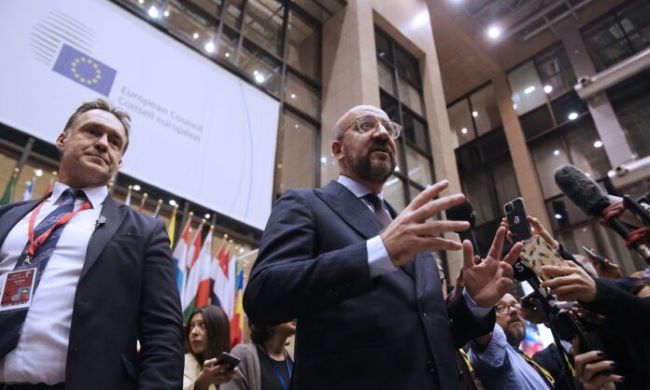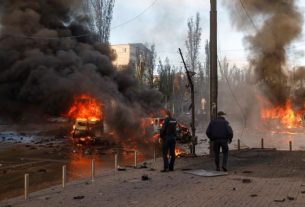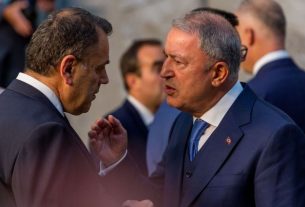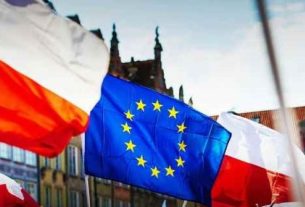BEIJING: Ahead of the second anniversary of the outbreak of the Russia-Ukraine conflict, which falls on Saturday, the EU has agreed a new package of sanctions against Russia that for the first time targets Chinese and Indian companies accused of “supporting Moscow’s war effort.” The relevant Chinese firms are yet to respond to the sanctions.
Chinese analysts said on Thursday that due to Russia’s progress in the battlefield, the US and Ukraine have pushed the EU to do more outside the battlefield to pressure Russia, but in the past two years, the sanctions against Russia have proven to be unsuccessful, and adding other countries’ firms, including Chinese ones, will do nothing to change the situation in the war.
The EU’s measures, which will be its 13th package of sanctions imposed in response to Russia’s military operation against Ukraine, target close to 200 individuals and entities but stop short of any sweeping economic action targeting crucial industrial sectors, the Financial Times reported on Thursday.
The inclusion of Chinese and Indian companies comes as the EU and its G7 partners attempt to crack down on Russia’s use of third countries and transit routes to evade existing curbs designed to hamper its war economy, according to the report.
Brussels had abandoned plans to sanction Chinese mainland companies under pressure from member states including Germany that were fearful of antagonizing China. But Russia’s continued ability to produce large numbers of drones, missiles, tanks and other weapons despite extensive Western trade bans has put pressure on G7 capitals to step up their anti-evasion efforts, said the FT report.
The measures will target three companies in the Chinese mainland and one in India, alongside businesses in Sri Lanka, Turkey, Thailand, Serbia and Kazakhstan, according to documents seen by the FT. The targeted businesses will be hit by trade restrictions after being identified as helping to supply equipment, particularly electronics and microchips, used by Russia to manufacture weapons or other equipment used in its war against Ukraine, said the report.
According to the South China Morning Post, the three Chinese mainland companies are Guangzhou Ausay Technology Co Limited, Shenzhen Biguang Trading Co Limited and Yilufa Electronics Limited. The Hong Kong company is RG Solutions Limited. They are part of a group of 193 named entities on the latest round of sanctions, including firms from Turkey, Kazakhstan, North Korea and India, bringing the total number blacklisted to almost 2,000.
The Global Times reporters tried to reach these companies on Thursday but all refused to comment on the EU sanctions. From public information, it’s difficult to find hard evidence proving that these companies have helped the Russian military against Ukraine.
Wang Yiwei, director of the Institute of International Affairs at the Renmin University of China, told the Global Times on Thursday that the EU’s sanctions came under pressure from Washington and Kiev, as the US wants the EU to take the responsibility of providing more help to Ukraine and put more pressure on Russia when some Western countries encounter difficulties in providing military aid.
“They noticed that only military aid by itself can’t help Ukraine to beat Russia, so now they try to escalate the sanctions to implicate other parties to pressure Russia. But all of these efforts are pointless and useless, because in the past two years, Western sanctions against Russia have proven to be a failure, and the corruption problem in Kiev means Western military aid cannot be fully transformed into combat capability,” Wang noted.
Therefore, sanctioning Chinese, Indian and other countries’ companies won’t help Ukraine gain any advantages, but will only impact the EU’s ties with the relevant countries, said Li Haidong, a professor at the China Foreign Affairs University.
“The current situation on the battlefield is making the West disappointed, and sanctioning other countries’ companies that are doing normal business with Russia won’t allow the West to completely change the pessimistic situation for Kiev,” Li said.
At the Foreign Ministers’ meeting of the G20 in Brazil, foreign ministers of Western countries on Wednesday attacked Russia over its conflict with Ukraine, as Russian Foreign Minister Sergei Lavrov listened, diplomats said, Reuters reported.
“Russia must be made to pay for its aggression,” British Foreign Minister David Cameron told the closed session, according to his office.
The top diplomats from the US, Australia, Canada, Germany, Italy, France and Norway made similar remarks on the first day of a two-day meeting. Norwegian Foreign Minister Espen Barth Eide told reporters that Lavrov calmly replied to Cameron’s remarks with “a set of alternative facts” about events in Ukraine. Lavrov did not speak to reporters.
Currently, the West and Kiev need to be more pragmatic and realistic in handling the conflict with Russia, as sanctions, wars of words and more conflicts cannot bring peace, and China will keep making efforts to help them to reach common ground with Russia and restart peace talks, no matter how difficult it is, said experts.
China has remained committed to promoting peace talks on the Ukraine issue and will not give up as long as there is a glimmer of hope, said Chinese Foreign Minister Wang Yi in a meeting with Ukrainian Foreign Minister Dmytro Kuleba, at the latter’s request, on the sidelines of the Munich Security Conference 2024 on Saturday.
“Over the past two years, the West has underestimated Russia, and overestimated Ukraine and Western countries themselves, and this is why Russia now has more advantages on the battlefield, while the West and Ukraine see more difficulties, and Moscow doesn’t care about the anger among the West, so maybe Western politicians need to rethink their strategy for handling the crisis and stop fanning flames,” Li noted.__Pakistan Today





